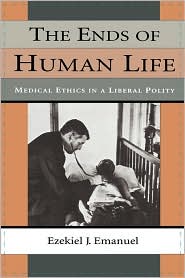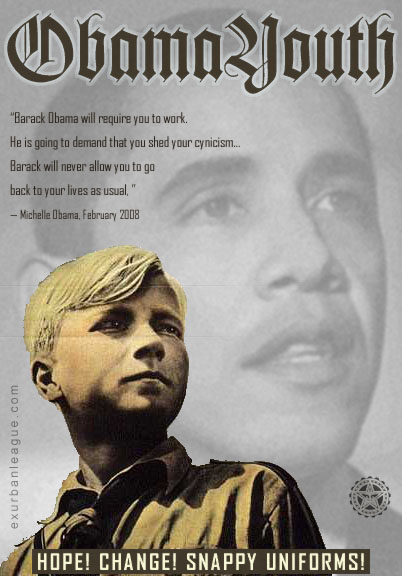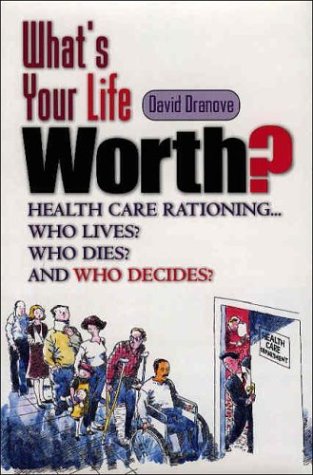
 President Obama’s White House Health Care policy adviser Dr. Ezekiel Emanuel, the brother of Obama’s Chief of Staff and President Obama’s own personal protector in chief, Rahm Emanuel.
President Obama’s White House Health Care policy adviser Dr. Ezekiel Emanuel, the brother of Obama’s Chief of Staff and President Obama’s own personal protector in chief, Rahm Emanuel.Dr. Emanuel has some very frightening and disturbing views about healthcare “reform” and now, his work seeks to change the way we live and how long we live for all Americans. Dr. Emanuel advocates a collectivist system of “merit-based” health care services called The Complete Lives System.
 Ezekiel J. Emanuel is at the top of the Department of Bioethics at The Clinical Center of the National Institutes of Health and a breast oncologist. He is on extended detail as a special adviser for health policy to the director of the White House Office of Management and Budget.
Ezekiel J. Emanuel is at the top of the Department of Bioethics at The Clinical Center of the National Institutes of Health and a breast oncologist. He is on extended detail as a special adviser for health policy to the director of the White House Office of Management and Budget.He completed his studies at Amherst College, where he received his M.Sc. from Oxford University in Biochemistry. His M.D. is from Harvard Medical School. He was given his PhD in political philosophy by Harvard University. His final dissertation was granted and he won the Toppan Award for the finest political science dissertation of the year. In 1987-88, he became a fellow in the Program in Ethics and the Professions at the Kennedy School of Government at Harvard.
 After completing his internship and residency in internal medicine at Boston's Beth Israel Hospital and his oncology fellowship at the Dana-Farber Cancer Institute, he joined the faculty at the Dana-Farber Cancer Institute. Dr. Emanuel was an Associate Professor at Harvard Medical School before joining the National Institutes of Health.
After completing his internship and residency in internal medicine at Boston's Beth Israel Hospital and his oncology fellowship at the Dana-Farber Cancer Institute, he joined the faculty at the Dana-Farber Cancer Institute. Dr. Emanuel was an Associate Professor at Harvard Medical School before joining the National Institutes of Health.
 JAMA, and many other medical journals. His book on medical ethics, The Ends of Human Life, has been widely praised and received honorable mention for the Rosenhaupt Memorial Book Award by the Woodrow Wilson Foundation. He has also published No Margin, No Mission: Health-Care Organizations and the Quest for Ethical Excellence and co-edited Ethical and Regulatory Aspects of Clinical Research: Readings and Commentary. Dr. Emanuel has written extensively for the popular press, with articles and op-eds appearing in The Atlantic, The New Republic, New York Times, Wall Street Journal, and many other publications.
JAMA, and many other medical journals. His book on medical ethics, The Ends of Human Life, has been widely praised and received honorable mention for the Rosenhaupt Memorial Book Award by the Woodrow Wilson Foundation. He has also published No Margin, No Mission: Health-Care Organizations and the Quest for Ethical Excellence and co-edited Ethical and Regulatory Aspects of Clinical Research: Readings and Commentary. Dr. Emanuel has written extensively for the popular press, with articles and op-eds appearing in The Atlantic, The New Republic, New York Times, Wall Street Journal, and many other publications. One must only read Dr. Emanuel's material for a short time to discover that he is very intelligent and very flawed in the areas as to the sacredness of all life, with priority of all human life. His ideas fit supremely into the current depopulation movement. Dr. Emanuel's views pay no regard to the constitution nor, more importantly, does it give any sacredness to human life making Emanuel's ideas ride on the back of a gray horse, which runs dangerously close to views also held by Nazi Germany. There is a very discernible lack of humanity in his call for very efficient and well-thought-out legal ways to commit legal mass murder. Dr. Ezekiel Emanuel calls his Eugenic-like plan The Complete Lives System.
One must only read Dr. Emanuel's material for a short time to discover that he is very intelligent and very flawed in the areas as to the sacredness of all life, with priority of all human life. His ideas fit supremely into the current depopulation movement. Dr. Emanuel's views pay no regard to the constitution nor, more importantly, does it give any sacredness to human life making Emanuel's ideas ride on the back of a gray horse, which runs dangerously close to views also held by Nazi Germany. There is a very discernible lack of humanity in his call for very efficient and well-thought-out legal ways to commit legal mass murder. Dr. Ezekiel Emanuel calls his Eugenic-like plan The Complete Lives System. Dr. Emanuel first published his ideas of merit-based healthcare in the 1996 Hastings Center Report (Volume 26, No. 6) of which you can read a portion right here, in his own words:
Dr. Emanuel first published his ideas of merit-based healthcare in the 1996 Hastings Center Report (Volume 26, No. 6) of which you can read a portion right here, in his own words:“This civic republican or deliberative democratic conception of the good provides both procedural and substantive insights for developing a just allocation of health care resources. Procedurally, it suggests the need for public forums to deliberate about
 which health services should be considered basic and should be socially guaranteed. Substantively, it suggests services that promote the continuation of the polity – those that ensure healthy future generations, ensure development of practical reasoning skills, and ensure full and active participation by citizens in public deliberations – are to be socially guaranteed as basic.
which health services should be considered basic and should be socially guaranteed. Substantively, it suggests services that promote the continuation of the polity – those that ensure healthy future generations, ensure development of practical reasoning skills, and ensure full and active participation by citizens in public deliberations – are to be socially guaranteed as basic.OBAMA ADVISERS WANT TO RATION CARE
Conversely, services provided to individuals who are irreversibly prevented from being or becoming participating citizens are not basic and should not be guaranteed. An obvious example is not guaranteeing health services to patients with dementia. A less obvious example is guaranteeing neuropsychological services to ensure children with learning disabilities can read and learn to reason.”

The proposed healthcare bills now in development in both houses of congress will all ultimately put the decisions about your care and your longevity in the hands of presidential appointees, Czars who were never elected nor confirmed. They are deciding what plans will cover, how much independence your doctor can have and what treatments and care senior citizens and the very young deserve. Medicare will eventually become a thing of the past.
At least two of President Obama's top health advisers should never be trusted with that much power. One of them is Dr. Ezekiel Emanuel, the brother of President Obama’s Chief of Staff Rahm Emanuel. Dr Emauel has already bee
 n appointed to two very important positions: health-policy adviser at the Office of Management and Budget and a member of Federal Council on Comparative Effectiveness Research. Emanuel has already warned the American public that the reductions in care for the very young and elderly will not be free of pain. Read Dr. Emanuel’s words below:
n appointed to two very important positions: health-policy adviser at the Office of Management and Budget and a member of Federal Council on Comparative Effectiveness Research. Emanuel has already warned the American public that the reductions in care for the very young and elderly will not be free of pain. Read Dr. Emanuel’s words below: "Vague promises of savings from cutting waste, enhancing prevention and wellness, installing electronic medical records and improving quality are merely 'lipstick' cost control, more for show and public relations than for true change," (Health Affairs Feb. 27, 2008).
"Vague promises of savings from cutting waste, enhancing prevention and wellness, installing electronic medical records and improving quality are merely 'lipstick' cost control, more for show and public relations than for true change," (Health Affairs Feb. 27, 2008).He has stated that savings would require that doctors change how they think about their patients: He believes that doctors take the Hippocratic Oath too seriously, "as an imperative to do everything for the patient regardless of the cost or effects on others" (Journal of the American Medical Association, June 18, 2008).
Yes, that may be what you want your doctor to do, but Dr. Emanuel wants doctors to look at the bigger picture and not just at the needs of their patients and consider social justice, such as whether the money could be better spent on somebody else. I would imagine that that most doctors are shocked and worried by the belief that a doctor's job is to achieve social justice one patient at a time.
Emanuel, however, believes that "communitarianism" (another word for Socialist) should dictate decisions on who gets care. He insists that medical care should be limited for the non-disabled, not given to those "who are irreversibly prevented from being or becoming participating citizens . . . as he felt similarly about not guaranteeing health services to patients with dementia" (Hastings Center Report, Nov.-Dec. '96). That means that care to a grandmother with Alzheimer’s, Parkinson's or to a child with capacity issue like cerebral palsy should be seriously limited at best.
He unambiguously supports, defends, and encourages discrimination against older patients: "Unlike allocation by sex or race, allocation by age is not invidious discrimination; every person lives through different life stages rather than being a single age. Even if 25-year-olds receive priority over 65-year-olds, everyone who is 65 years now was previously 25 years" (Lancet, Jan. 31).
"Some people wrongly suggest that allocation can be based purely on scientific or clinical facts, often using the term “medical need”. There are no value-free medical criteria for allocation.
When implemented, the complete lives system produces a priority curve on which individuals aged between roughly 15 and 40 years get the most substantial chance, whereas the youngest and oldest people get chances that are attenuated.
Unlike allocation by sex or race, allocation by age is not invidious discrimination; every person lives through different life stages rather than being a single age. Even if 25-year-olds receive priority over 65-year-olds, everyone who is 65 years now was previously 25 years. Treating 65-year-olds differently because of stereotypes or falsehoods would be ageist; treating them differently because they have already had more life-years is not."
 Accepting the complete lives system for health care as a whole would be premature. We must first reduce waste and increase spending.
Accepting the complete lives system for health care as a whole would be premature. We must first reduce waste and increase spending.Dr. Emanuel’s Complete Lives methodology of applying his interpretation of both “allocative” and “distributive” justice to healthcare is put forth in the context of making sure that scarce medical resources are available first to those who remain productive and inclusive in society. That’s an important consideration
 when reviewing his “Complete Lives” proposal; it is not meant to address the allocation and distribution of readily available and plentiful medical resources, only scarce ones. It is a system divided into two levels of medical care, basic (guaranteed) and discretionary (not guaranteed) medical services. Some citizens (The very young and the elderly) will receive only basic services while others (Those who, in the government’s eyes, have not exhausted their complete lives) will receive both basic and some discretionary health services.
when reviewing his “Complete Lives” proposal; it is not meant to address the allocation and distribution of readily available and plentiful medical resources, only scarce ones. It is a system divided into two levels of medical care, basic (guaranteed) and discretionary (not guaranteed) medical services. Some citizens (The very young and the elderly) will receive only basic services while others (Those who, in the government’s eyes, have not exhausted their complete lives) will receive both basic and some discretionary health services. One of President Obama’s most proclaimed goals has always been healthcare “reform” and the reduction of costs and the spending of America’s treasure on healthcare. That certainly implies that money – tax dollars or deficit dollars – will essentially be a medical resource. This could very easily create a manufactured scenario that could produce the kind of scarcity that would
One of President Obama’s most proclaimed goals has always been healthcare “reform” and the reduction of costs and the spending of America’s treasure on healthcare. That certainly implies that money – tax dollars or deficit dollars – will essentially be a medical resource. This could very easily create a manufactured scenario that could produce the kind of scarcity that wouldautomatically invoke Dr. Emanuel’s bio-ethical philosophies. Dr Emanuel, Special Advisor to the Director of the White House Office of Management and Budget for health policy and would undoubtedly be consulted on forced reductions in spending on healthcare.
It is all terribly frightening and not for the faint of heart. There are just too many ways that Dr. Emanuel’s own personal type of eugenics; this evil form of rationing could be law very soon into the future.
Dr. Ezekiel Emanuel’s Own Words
Because none of the currently used systems satisfy all ethical requirements for just allocation, we propose an alternative:
 This system incorporates five principles (table 2): youngest-first, prognosis, save the most lives, lottery, and instrumental value. As such, it prioritizes younger people who have not yet lived a complete life and will be unlikely to do so without aid. Many thinkers have accepted complete lives as the appropriate focus of distributive justice: “individual human lives, rather than individual experiences, [are] the units over which any distributive principle should operate.”1,75,76 Although there are important differences between these thinkers, they share a core commitment to consider entire lives rather than events or episodes, which is also the defining feature of the complete lives system. Consideration of the importance of complete lives also supports modifying the youngest-first principle by
This system incorporates five principles (table 2): youngest-first, prognosis, save the most lives, lottery, and instrumental value. As such, it prioritizes younger people who have not yet lived a complete life and will be unlikely to do so without aid. Many thinkers have accepted complete lives as the appropriate focus of distributive justice: “individual human lives, rather than individual experiences, [are] the units over which any distributive principle should operate.”1,75,76 Although there are important differences between these thinkers, they share a core commitment to consider entire lives rather than events or episodes, which is also the defining feature of the complete lives system. Consideration of the importance of complete lives also supports modifying the youngest-first principle by prioritizing adolescents and young adults over infants (figure). Adolescents have received substantial education and parental care, investments that will be wasted without a complete life. Infants, by contrast, have not yet received these investments. Similarly, adolescence brings with it a developed personality capable of forming and valuing long-term plans whose fulfillment requires a complete life.77 As the legal philosopher Ronald Dworkin argues, “It is terrible when an infant dies, but worse, most people think, when a three-year-old child dies and worse still when
prioritizing adolescents and young adults over infants (figure). Adolescents have received substantial education and parental care, investments that will be wasted without a complete life. Infants, by contrast, have not yet received these investments. Similarly, adolescence brings with it a developed personality capable of forming and valuing long-term plans whose fulfillment requires a complete life.77 As the legal philosopher Ronald Dworkin argues, “It is terrible when an infant dies, but worse, most people think, when a three-year-old child dies and worse still when an adolescent does”;78 this argument is supported by empirical surveys.41,79 Importantly, the prioritization of adolescents and young adults considers the social and personal investment that people are morally entitled to have received at a particular age, rather than accepting the results of an unjust status quo. Consequently, poor adolescents should be treated the same as wealthy ones, even though they may have received less investment owing to social injustice.
an adolescent does”;78 this argument is supported by empirical surveys.41,79 Importantly, the prioritization of adolescents and young adults considers the social and personal investment that people are morally entitled to have received at a particular age, rather than accepting the results of an unjust status quo. Consequently, poor adolescents should be treated the same as wealthy ones, even though they may have received less investment owing to social injustice. The complete lives system also considers prognosis, since its aim is to achieve complete lives. A young person with a poor prognosis has had few life-years but lacks the potential to live a complete life. Considering prognosis forestalls the concern that disproportionately large amounts of resources will be directed to young people with poor prognoses.42 When the worst-off can benefit only slightly while better-off people could benefit greatly, allocating to the better-off is often justifiable.1,30 Some small benefits, such as a few weeks of life, might also be intrinsically insignificant when compared with large benefits.8
The complete lives system also considers prognosis, since its aim is to achieve complete lives. A young person with a poor prognosis has had few life-years but lacks the potential to live a complete life. Considering prognosis forestalls the concern that disproportionately large amounts of resources will be directed to young people with poor prognoses.42 When the worst-off can benefit only slightly while better-off people could benefit greatly, allocating to the better-off is often justifiable.1,30 Some small benefits, such as a few weeks of life, might also be intrinsically insignificant when compared with large benefits.8 Saving the most lives is also included in this system because enabling more people to live complete lives is better than enabling fewer.8,44 In a public health emergency, instrumental value could also be included to enable more
Saving the most lives is also included in this system because enabling more people to live complete lives is better than enabling fewer.8,44 In a public health emergency, instrumental value could also be included to enable morepeople to live complete lives. Lotteries could be used when making choices between roughly equal recipients, and also potentially to ensure that no individual—irrespective of age or prognosis—is seen as beyond saving.34,80
Thus, the complete lives system is complete in another way: it incorporates each morally relevant simple principle. When implemented, the complete lives system produces a priority curve on which individuals aged between roughly 15 and 40 years get the most substantial chance, whereas the youngest and oldest people get chances that are attenuated (figure).78 It therefore superficially resembles the
 proposal made by DALY advocates; however, the complete lives system justifies preference to younger people because of priority to the worst-off rather than instrumental value. Additionally, the complete lives system assumes that, although life-years are equally valuable to all, justice requires the fair distribution of them. Conversely, DALY allocation treats life-years given to elderly or disabled people as objectively less valuable.
proposal made by DALY advocates; however, the complete lives system justifies preference to younger people because of priority to the worst-off rather than instrumental value. Additionally, the complete lives system assumes that, although life-years are equally valuable to all, justice requires the fair distribution of them. Conversely, DALY allocation treats life-years given to elderly or disabled people as objectively less valuable. Finally, the complete lives system is least vulnerable to corruption. Age can be established quickly and accurately from identity documents. Prognosis allocation encourages physicians to improve patients’ health, unlike the perverse incentives to sicken patients or misrepresent health that the sickest-first allocation creates.58,59
Finally, the complete lives system is least vulnerable to corruption. Age can be established quickly and accurately from identity documents. Prognosis allocation encourages physicians to improve patients’ health, unlike the perverse incentives to sicken patients or misrepresent health that the sickest-first allocation creates.58,59Objections
We consider several important objections to the complete lives system.
 The complete lives system discriminates against older people.81,82 Age-based allocation is ageism.82 Unlike allocation by sex or race, allocation by age is not invidious discrimination; every person lives through different life stages rather than being a single age.8,39 Even if 25-year-olds receive priority over 65-year-olds, everyone who is 65 years now was previously 25 years.16 Treating 65-year-olds differently because of stereotypes or falsehoods would be ageist; treating them differently because they have already had more life-years is not.
The complete lives system discriminates against older people.81,82 Age-based allocation is ageism.82 Unlike allocation by sex or race, allocation by age is not invidious discrimination; every person lives through different life stages rather than being a single age.8,39 Even if 25-year-olds receive priority over 65-year-olds, everyone who is 65 years now was previously 25 years.16 Treating 65-year-olds differently because of stereotypes or falsehoods would be ageist; treating them differently because they have already had more life-years is not. Age, like income, is a “non-medical criterion” inappropriate for allocation of medical resources.14,83 In contrast to income, a complete life is a health outcome. Long-term survival and life expectancy at birth are key health-care outcome variables.84 Delaying the age at onset of a disease is desirable.85,86 The complete lives system is insensitive to international differences in typical lifespan. Although broad consensus
Age, like income, is a “non-medical criterion” inappropriate for allocation of medical resources.14,83 In contrast to income, a complete life is a health outcome. Long-term survival and life expectancy at birth are key health-care outcome variables.84 Delaying the age at onset of a disease is desirable.85,86 The complete lives system is insensitive to international differences in typical lifespan. Although broad consensusfavors adolescents over very young infants, and young adults over the very elderly people, implementation can reasonably differ between, even within, nation-states.87,88 Some people believe that a complete life is a universal limit founded in natural human capacities, which everyone should accept even without scarcity.37 By contrast, the complete lives system requires only that citizens see a complete life, however defined, as an important good, and accept that fairness gives those short of a complete life stronger claims to scarce life-saving resources.
Principles must be ordered lexically: less important principles should come into play only when more important ones are fulfilled.10 Rawls himself agreed that lexical priority was inappropriate when distributing specific resources in society, though appropriate for ordering the prin
Accepting the complete lives system for health care as a whole would be premature. We must fi rst reduce waste and increase spending.81,90 The complete lives system explicitly rejects waste and corruption, such as multiple listing for transplantation. Although it may be applicable more generally, the complete lives system has been developed to justly allocate persistently scarce life-saving interventions.39,80 Hearts for transplant and influenza vaccines, unlike money, cannot be replaced or diverted to non-health goals; denying a heart to one person makes it available to another. Ultimately, the complete lives system does not create “classes of Untermenschen whose lives and well being are deemed not worth spending money on”,91 but rather empowers us to decide fairly whom to save when genuine scarcity makes saving everyone impossible.
 Ultimately, none of the eight simple principles recognize all morally relevant values, and some recognize irrelevant values. QALY and DALY multi-principle systems neglect the importance of fair distribution. UNOS points systems attempt to address distributive justice, but recognize morally irrelevant values and are vulnerable to corruption. By contrast, the complete lives system combines four morally relevant principles: youngest-first, prognosis, lottery, and saving the most lives. In pandemic situations, it also allocates scarce interventions to people instrumental in realizing these four principles. Importantly, it is not an algorithm, but a framework that expresses widely affirmed
Ultimately, none of the eight simple principles recognize all morally relevant values, and some recognize irrelevant values. QALY and DALY multi-principle systems neglect the importance of fair distribution. UNOS points systems attempt to address distributive justice, but recognize morally irrelevant values and are vulnerable to corruption. By contrast, the complete lives system combines four morally relevant principles: youngest-first, prognosis, lottery, and saving the most lives. In pandemic situations, it also allocates scarce interventions to people instrumental in realizing these four principles. Importantly, it is not an algorithm, but a framework that expresses widely affirmed  values: priority to the worst-off , maximizing benefits, and treating people equally. To achieve a just allocation of scarce medical interventions, society must embrace the challenge of implementing a coherent multi-principle framework rather than relying on simple principles or retreating to the status quo.
values: priority to the worst-off , maximizing benefits, and treating people equally. To achieve a just allocation of scarce medical interventions, society must embrace the challenge of implementing a coherent multi-principle framework rather than relying on simple principles or retreating to the status quo. There may be many in Washington D.C who want to do as they please without having to explain themselves to the American people. Nevertheless, the American people are the ones who must decide what is good for them. The whole goal of Barack Obama and his shadow government is to reduce the population, reduce cost and to accomplish this however the ends justify the means. If this bill passes, there will never be a return to capitalism, to free speech, to self-determination.
There may be many in Washington D.C who want to do as they please without having to explain themselves to the American people. Nevertheless, the American people are the ones who must decide what is good for them. The whole goal of Barack Obama and his shadow government is to reduce the population, reduce cost and to accomplish this however the ends justify the means. If this bill passes, there will never be a return to capitalism, to free speech, to self-determination.  It is time to stand up. I do agree that the anger is manufactured. It is the Obama Administration which has manufactured this outpouring of worry and emotion, and it is we the people, who are now and who will continue to declare, "Read the bill," "Hear our voice," "Get out of our lives" and "Restore the Constitution." Unless we stand up now and refuse intimidation or forced legislation that will ruin our lives, you will one day weep for the great nation that will be no more.
It is time to stand up. I do agree that the anger is manufactured. It is the Obama Administration which has manufactured this outpouring of worry and emotion, and it is we the people, who are now and who will continue to declare, "Read the bill," "Hear our voice," "Get out of our lives" and "Restore the Constitution." Unless we stand up now and refuse intimidation or forced legislation that will ruin our lives, you will one day weep for the great nation that will be no more.Steven Clark Bradley

 Have you ever felt that the world was guided in ways that are beyond man’s control? The constant changes in the world since the time of Nimrod 4000 years ago until today and all the events that have shaken the world have been to bring the universe back into the hands of the Prince of Darkness, Lucia, a world that he had ruled with his Watchers before it was all ripped from his grasp when man was created. Nimrod Rising paints a diabolical picture of how the Prince of Darkness executes his evil plot to take the world back by force and destroy civilization in the process. From the Great Builder Nimrod in 4000 BC to today, 666 generations later, you can ride the storm of Nimrod Rising and experience the death of a world and the birth pangs of another. You will swear it is really upon us!
Have you ever felt that the world was guided in ways that are beyond man’s control? The constant changes in the world since the time of Nimrod 4000 years ago until today and all the events that have shaken the world have been to bring the universe back into the hands of the Prince of Darkness, Lucia, a world that he had ruled with his Watchers before it was all ripped from his grasp when man was created. Nimrod Rising paints a diabolical picture of how the Prince of Darkness executes his evil plot to take the world back by force and destroy civilization in the process. From the Great Builder Nimrod in 4000 BC to today, 666 generations later, you can ride the storm of Nimrod Rising and experience the death of a world and the birth pangs of another. You will swear it is really upon us!Author Steven Clark Bradley
From The Mind of Steven Clark Bradley
Steven Clark Bradley @ Inspired Author
Steven Clark Bradley - Nikki Leigh Virtual Book Tours
Steven Clark Bradley @ The Power of The Written Word
Steven Clark Bradley @ Communati.com
Steven Clark Bradley @ Blogtalk Radio.com
Steven Clark Bradley @ Facebook
Steven Clark Bradley @ Twitter.com
Steven Clark Bradley @ Xanga.com
Steven Clark Bradley @ Amazon.com
Steven Clark Bradley @ yuku.com
Steven Clark Bradley @ Bookmarket.com
Steven Clark Bradley @ Published Authors.com
Steven Clark Bradley @ Word That Work
Steven Clark Bradley @ Goodreads.com
Steven Clark Bradley @ Myspace.com
What if It's True



1 comment:
Nice post as for me. I'd like to read more about that matter. Thanx for sharing this information.
Sexy Lady
London escorts
Post a Comment